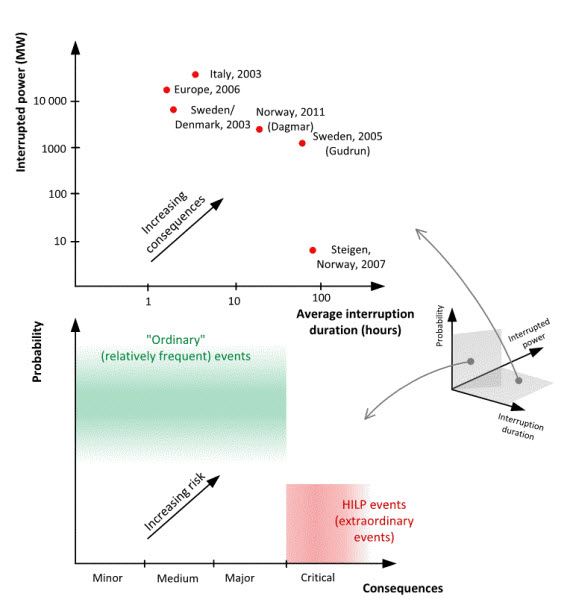Society is increasingly dependent on a secure electricity supply. This perhaps most evident at the rare occurrences of extensive and long-lasting blackouts. Such blackouts may have a very low probability of occurring, but if they do occur, the societal consequences (impact) can be very high. Therefore, such extraordinary events are often referred to as High-Impact Low-Probability (HILP) events.
For the Transmission System Operators (TSOs) and for society at large, HILP events are particularly challenging to analyse, understand and identify. Compared to "ordinary" power supply interruptions, the cause and effect relationships are more complex, the uncertainties are greater, and it is psychologically more challenging to deal with events believed to be extremely unlikely or even unimaginable. The challenge is amplified by the increasing complexity and uncertainties of the power system due to integration of distributed renewable power generation, more extreme weather, and stronger integration between the Nordic power system and the power systems in the rest of Europe, among other things.

The HILP project has developed methods and tools for analysing risk and vulnerability related to HILP events. The methods and tools have been developed in cooperation with TSOs and energy regulators. New methods and tools help raise awareness of potential vulnerabilities, identify promising barriers to mitigate the risk of HILP events, and strengthen the ability of TSOs to make the trade-off between security of supply and societal costs in planning and operation of the power system. For a popular science summary of the results from the project, please see this blog post.
Publications
Sperstad, I. B.; Kjølle, G. H.; Norum, E. Ø.: Accounting for Uncertainties Due to High-Impact Low-Probability Events in Power System Development. Electric Power Systems Research, Vol. 193, April 2021.
Kiel, E. S.; Kjølle, G. H.: Reliability of Supply and the Impact of Weather Exposure and Protection System Failures. Applied Sciences, Vol. 11, 2021.
Sperstad, I. B.; Solvang, E. H.; Jakobsen, S. H.: A graph-based modelling framework for vulnerability analysis of critical sequences of events in power systems. International Journal of Electrical Power & Energy Systems, Vol. 125, February 2021.
Sperstad, I. B.; Solvang, E. H.; Jakobsen, S. H.; Gjerde, O.: Data Set for Reliability Analysis Using a Four-Area Test Network. Data in Brief, 2020.
Kiel, E. S.: Kjølle, G. H.: A Bayesian Network approach to predicting transmission line down times. Proceedings of the 30th European Safety and Reliability Conference and the 15th Probabilistic Safety Assessment and Management Conference (ESREL2020 PSAM 15), Nov. 2020.
Sperstad, I. B.; Kjølle, G. H.; Gjerde, O.: A Comprehensive Framework for Vulnerability Analysis of Extraordinary Events in Power Systems. Reliability Engineering & System Safety, Vol. 196, April 2020.
Kiel, E. S.; Kjølle, G. H.: The impact of protection system failures and weather exposure on power system reliability. IEEE International Conference on Environment and Electrical Engineering, June 2019, Genova, Italy.
Solvang, E. H.; Sperstad, I. B.; Jakobsen, S. H.; Uhlen, K.: Dynamic simulation of simultaneous HVDC contingencies relevant for vulnerability assessment of the nordic power system. IEEE Milan PowerTech, June 2019, Milan, Italy.
Kiel, E. S.; Kjølle, G. H.: Transmission line unavailability due to correlated threat exposure. IEEE Milan PowerTech, Milan, Italy, June 2019.
Kiel, E. S.; Kjølle, G. H.: Identification, visualization and reduction of risk related to HILP events in power systems. 54th International Universities Power Engineering Conference (UPEC), Sept. 2019, Bucharest, Romania.
Vrana, T.K.; Sperstad, I. B.: Transmission line length estimation based on electrical parameters. MEDPOWER 2018, Dubrovnik, Croatia, Nov. 2018.
Sperstad, I. B.; Kiel, E. S.: Development of a Qualitative Framework for Analysing High-Impact Low-Probability Events in Power Systems. European Safety & Reliability Conference (ESREL), 2018, Trondheim, Norway.
Sperstad, I. B.: Identifying high-impact operating states in power system reliability analysis. Probabilistic Methods Applied to Power Systems (PMAPS), 2018, IEEE International Conference on, Boise, ID, USA, IEEE.
Sperstad, I. B.; Kjølle, G. H.; Gjerde, O.; Vrana, T. K.; Jakobsen, S. H.; Turunen, J.; Haarla, L. (2018). Vulnerability Analysis of HVDC Contingencies in the Nordic Power System. SINTEFblog. Report no. C2-132, CIGRE Session, 2018, Paris, France.
Solheim, Ø.R.; Trötscher, T.; Kjølle, G. H.: Wind Dependent Failure Rates for Overhead Transmission Lines Using Reanalysis Data and a Bayesian Updating Scheme. International Conference on Probabilistic Methods Applied to Power Systems (PMAPS), Oct. 2016, Beijing, China.
Master theses at NTNU
Berg, T. V.: Combining analytical power system reliability assessment methods with Monte Carlo simulation. 2019.
Jensen, A. G.: Weather Models for Capturing Wind Related Failures in Probabilistic Reliability Analysis. 2019.
Moreno, S. S.: Statistisk Mekaniske Tilnærminger til Analyse av Blackouts. 2019.
Solvang, E. H.: Dynamic Simulations of Simultaneous HVDC Contingencies in the Nordic Power System Considering System Integrity Protection Schemes. 2018.
Nordhagen, S. W.: Reliability Analysis of the Nordic44 Model and modelling of corrective Actions in OPAL. 2017.
PhD thesis at NTNU
Kiel, E. S.: Methods for Understanding and Communicating Uncertainty and Risk Related to Extraordinary Events in Power Systems. 2021.
Partners


